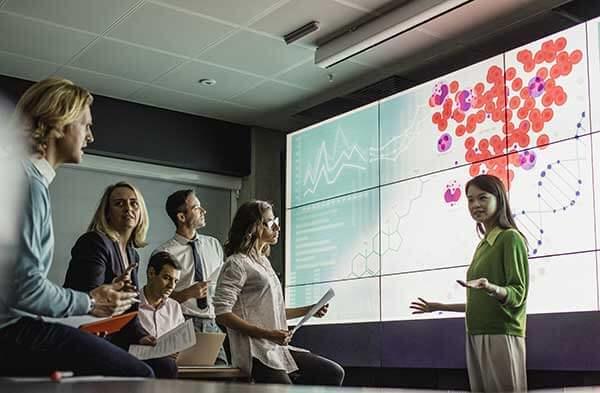There are many groups for fellows that you can join to help foster a sense of community here at NIH. The groups range from special interest groups to opportunities to gain leadership or helping to advocate for fellows on campus. Many of these groups are hosted by either the National Cancer Institute (NCI) or the Office of Intramural Training and Education (OITE).
NCI Fellows Groups
These groups are hosted specifically by the National Cancer Institute and can serve as opportunities to gain leadership and management experiences, as well as extend your network.
Cancer Community Partnership (CCP)
The Cancer Community Partnership (CCP) is a collaboration between individuals affected by cancer, patient advocates, and researchers. CCP’s goal is to learn from one another through inclusive conversations and to influence the development of cancer science and cancer care by integrating the patient experience at all levels. For questions, please contact us at cancercommunity@nih.gov.
CCR Fellows and Young Investigators (FYI) Association
CCR-FYI enhances the intramural training program, fosters communication among NCI fellows and the CCR research community, and serves as a liaison to CCR senior management on programs affecting the training experience.
All NCI fellows are invited to join the CCR-FYI Association and participate in the CCR-FYI Steering Committee meetings, which take place on the last (non-holiday) Thursday of the month.
NIH/NCI Fellows Editorial Board
The NIH/NCI Fellows Editorial Board offers fellows a free, confidential scientific document-editing service and gives fellows who join the Board editorial training and experience. Membership in the Editorial Board is open to all NIH or FDA fellows and other professionals upon approval of their supervisors and consultation with the senior editor of the Editorial Board. Previous editorial experience is not required.
NCI Education and Outreach Program
The NCI Education and Outreach Program connects scientists with schools in the communities surrounding the NCI campuses. This program aims to enhance our next generation of scientist's STEM experiences from elementary school through high school, while empowering teachers to provide high-quality science education.
NCI Global Health Interest Group
NCI Global Health Interest Group, established in October 2021, is a fellow-led NCI interest group aimed at facilitating learning and networking among fellows interested in global cancer research and control with a particular emphasis on work in Low-Middle Income Countries (LMICs).
Goals
- Promote collaboration and knowledge-sharing between fellows, across NCI divisions, engaged or interested in issues of global cancer research and control
- Organize and facilitate trans-disciplinary global oncology seminars, trainings, and networking opportunities with experts in the field
- Support professional development in topics such as scientific communication, cultural competencies, leadership, and career planning
- Collaborate with NCI-CGH to provide guidance and input on CGH-led research, trainings, and partnership activities for fellows
Membership
Open to fellows (summer, postbaccalaureate, predoctoral, postdoctoral, and clinical), across NCI, with interests in global cancer research and control with an emphasis on work in LMICs. To join the NCI Global Health Interest and/or to be added to the Listserv, please email NCIGHIG@NIH.GOV.
NIH-Wide Fellows Groups
There are many fellows’ groups both within the NCI and NIH-wide that you can join during your time here. These groups have many leadership positions available and numerous committees on which you can participate.
Fellows Committee (FelCom)
FelCom is comprised of a basic and a clinical fellow representative from each institute of NIH and serves the NIH fellows community through the actions of eight subcommittees and fifteen committee liaisons. The committee discusses areas of concern, the progress of current projects, and receives reports from representatives serving as liaisons. Meetings are open to all NIH fellows and are scheduled for the first Thursday of every month in Building 1: Wilson Hall (3rd Floor).
Graduate Student Council
The Graduate Student Council (GSC) was created with three specific goals: 1) Address and represent the intellectual, social, and living needs of the community of graduate students at the NIH, 2) Foster the development of an interactive and stimulating student environment at NIH by creating a forum for needs to be discussed with the student body, and 3) Serve as a communication pathway by which students as a group may interact with the rest of the NIH community.
The GSC coordinates and sponsors events to enhance the training experience of the NIH graduate students. GSC meetings are held the last non-holiday Tuesday of each month at 5pm in Bldg 10 Rm 1N263 (grad student lounge). All grad students are welcome to visit the meeting to learn about what the Council is doing and to offer ideas and suggestions.
NIH Visiting Fellows Committee
The NIH Visiting Fellows Committee (NIHVFC) is composed of NIH post-doctoral visiting fellows (VFs) from all around the world. It is a self-governing body serving the interest of visiting fellows in their transition to life at the NIH, by working to make their experience here worthwhile; as well as creating the opportunities for visiting fellows to maintain continuity in their research upon returning to their home countries. NIHVFC also plans to encourage the establishment and maintenance of strong institutional links of VFs with NIH after they complete their training and go back to their home countries.
